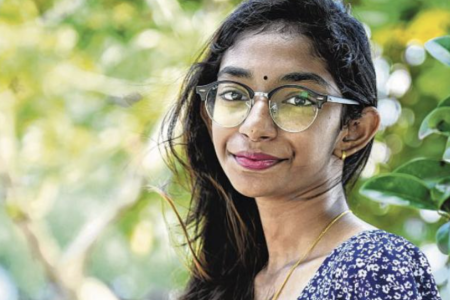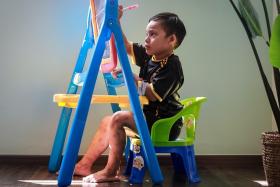Scars remind 17-year-old to live life to the fullest
When Ashwini Thirupathi woke up with a fever one morning last July, in the midst of her preparations for the GCE O’ Levels, she thought nothing of it and duly took a few rounds of aspirin.
But days went by and the fever still persisted, peaking at 45 deg C. The 16-year-old’s parents then took her to KK Women’s and Children’s Hospital (KKH), where they received some shocking news.
The diagnosis was infective endocarditis, a rare bacterial infection that causes abscesses and vegetations around the heart valves.
Ashwini soon found herself in the hospital’s operating theatre, where she underwent a 12-hour open-heart surgery.
The experience, she said, left her with both physical and emotional scars, including one that stretches from her chest to her collarbone.
She told tabla: “I don’t worry about what others think. People accept tattoos; they should view my scar the same way.”
Ashwini was not fully aware of her condition before her surgery. Her parents, worried about the risks involved, as outlined by the doctors, chose not to inform her – “they wanted to protect me from the dread”.
Dr Charmaine Chan, a consultant in cardiology with KKH, explained: “When a person is affected by infective endocarditis, bacteria enter the bloodstream and attach to a damaged part of the heart lining or valves, forming vegetations.
“In Ashwini’s case, a large vegetation on her mitral valve caused significant damage and holes in her valve, as well as abscess around the valve.”
Dr Chan added that infective endocarditis is not a common condition among children, especially those without a history of congenital heart disease. Cases of infective endocarditis that require surgery are rarer, she said, with just three cases over the last 10 years.
Ashwini recalled waking from the surgery with tubes in her nose, mouth and urinary tract.
“I was unable to talk for two days, I had to type out words to speak to my parents,” she said. “I had to have a glucose drip for three weeks before I could finally drink something.”
It was only while recovering from surgery that Ashwini learnt of her situation, when the surgeon explained it to her.
“Until then, I thought that I had undergone only a stomach procedure. I was just blank with shock when I heard the news,” she said.
After weeks of post-surgery rehab and a significant loss of study time, Ashwini was determined not to delay her O’Level examinations. “I didn’t want my situation to hold me back. Regardless of my exam results, I was eager to move forward,” she said.
Though she did not secure a place in a mass communications course at a polytechnic as she had hoped, Ashwini enrolled in a criminology diploma programme at Kaplan University.
Now almost a year since the surgery, Ashwini is determined to move on. While she can’t partake in vigorous physical activities, she goes for regular walks to ease herself into normal life. Engaging in community service also helps her relax.
Doctors have informed her that, despite surviving the surgery, there remained ongoing risks. Her situation has been described to her as a “ticking time bomb,” suggesting a likelihood of future complications or the need for additional medical interventions.
“Recently, I was admitted to the hospital again – for just a slight pain in the chest. This is what I have to live with – anticipation and caution,” she said.
“But the aftermath of the surgery has made me stronger and weaker in different ways. I remind myself that it’s okay to feel scared or insecure and that the feeling will pass.”
Get The New Paper on your phone with the free TNP app. Download from the Apple App Store or Google Play Store now


